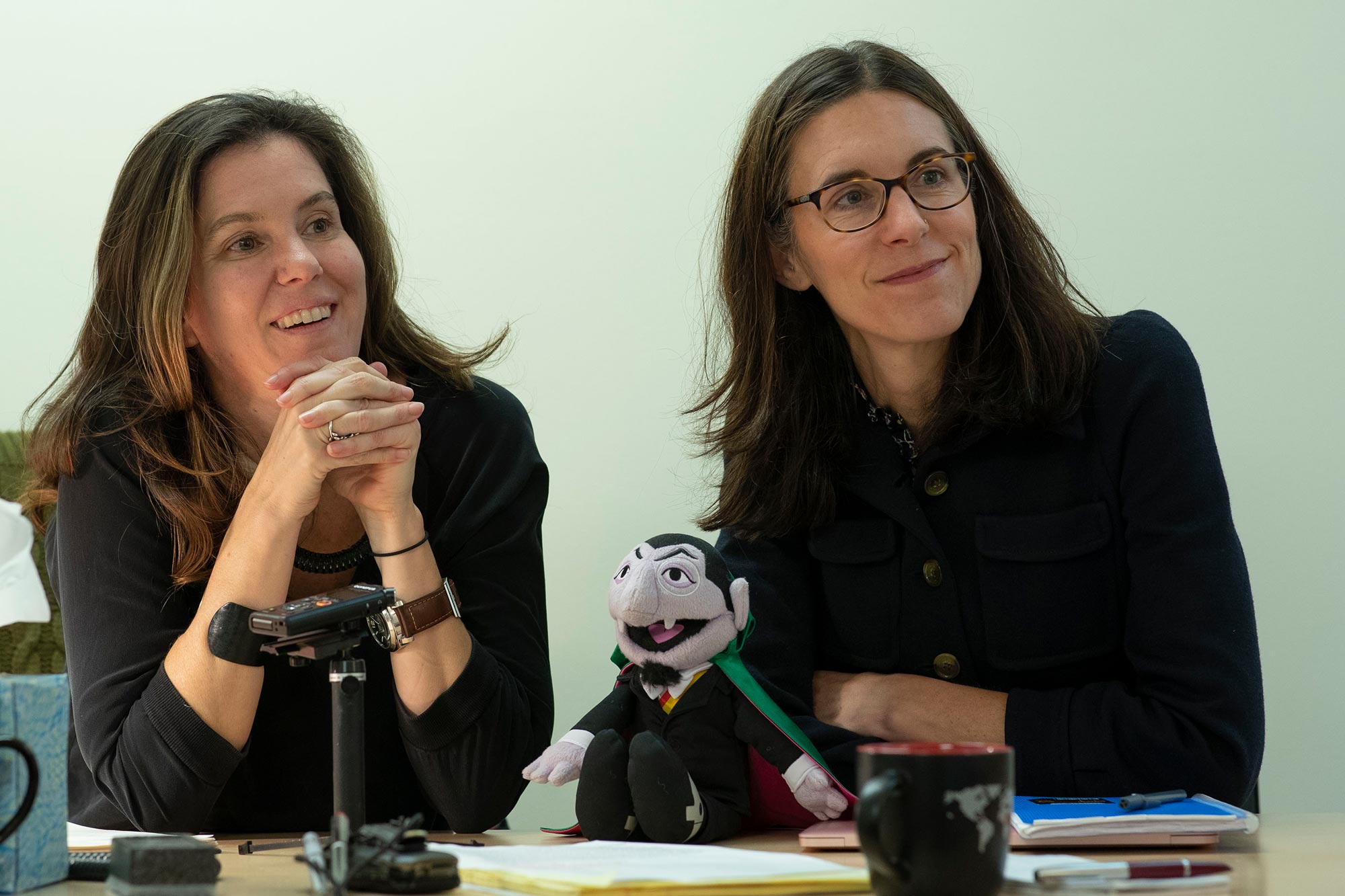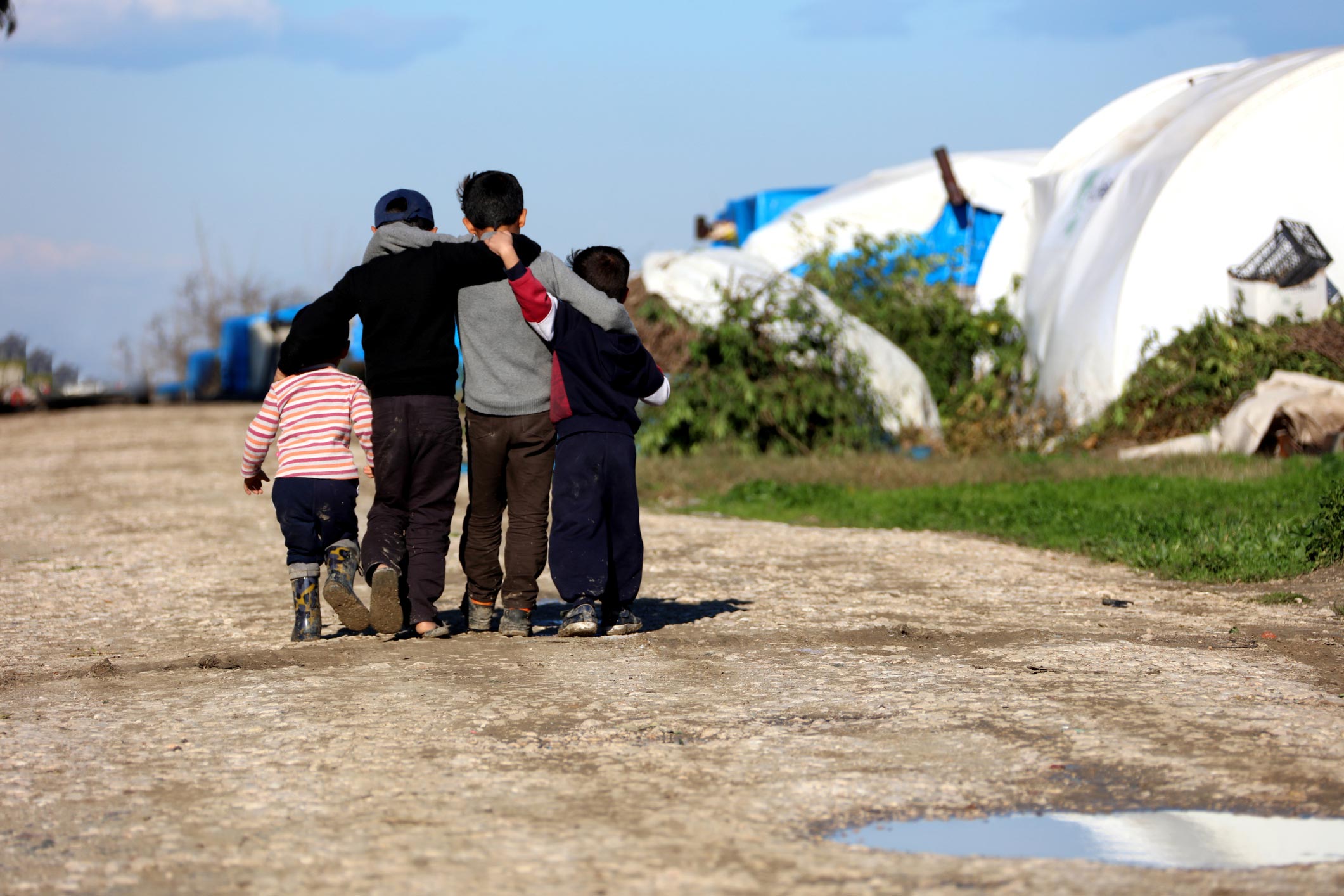Humanitarian aid has historically functioned as short-term, emergency care in times of crisis, similar to an ambulance crew arriving at an accident scene.
But with the rise of natural disasters and the record 70 million refugees worldwide, the mission of humanitarian aid has grown more complex. In 2020, international aid workers are looking at 31 severe, multi-faceted, long-term crises in places such as Syria, Haiti and Libya.
Two faculty members in the University of Virginia’s Frank Batten School of Leadership and Public Policy – Kirsten Gelsdorf, professor of practice of public policy, and Lucy Bassett, associate professor of practice of public policy – recently joined forces to help what is perhaps the most vulnerable population in the world: children living in areas of crisis and conflict.
Their effort was launched under the umbrella of the UVA Humanitarian Collaborative, a new initiative in which faculty members, practitioners, students and community members engage in policy-relevant research on global humanitarian challenges. The project, funded by the UVA Strategic Investment Fund and Center for Global Innovation + Inquiry, and supported by the Batten School’s Global Policy Center, is an opportunity for the two Batten professors to bridge the practitioner/academia gap, getting teams of faculty and students to wrestle with pressing, real-world problems.

Frank Batten School of Leadership and Public Policy professors of practice Kirsten Gelsdorf and Lucy Bassett with “Sesame Street” character Count Von Count. (Photo by Dan Addison, University Communications)
Bassett has more than 15 years of experience in humanitarian and development programming connected to the needs of children, caregivers and their communities. An education and social protection specialist with the World Bank for 10 years prior to joining the faculty at Batten, she has also worked at UNICEF, the World Food Program, Save the Children and the international Food Policy Research Institute.
Gelsdorf has 19 years of experience working in the humanitarian sector, most recently as the chief of the Policy Analysis and Innovation section at the United Nations Office of Coordination of Humanitarian Affairs. Her career includes long-term field postings and operational deployments to numerous emergencies, including the international responses to Hurricane Mitch in Honduras, the Ethiopian famine, the South African regional food crisis, the Liberian war, the tsunami in Indonesia, Hurricane Katrina, the Pakistan earthquake, the Timor-Leste security crisis, the global food crisis and the Haiti earthquake.
As professors of practice, the two teach about half time and then work on policy and program evaluation issues.
UVA Today spoke to them about children trapped in humanitarian crises.
Q. What are you trying to do with this collaborative?
Gelsdorf: In 2020, the United Nations estimates that nearly 168 million people will need global humanitarian assistance and protection. This represents one in about 45 people in the world, and is the highest figure in decades.
We hope to launch a series of labs that can connect practitioner and academic communities and their research and policy agendas. We want to find ways in which UVA can contribute to finding solutions to the humanitarian response challenges being faced at the local, national and global level.
Q. What kind of challenges?
Bassett: I have spent most of my career on early childhood development, [researching] how we get the youngest children to thrive, grow, learn and be productive members of society. Kirsten has spent her career working on operational and policy responses to global humanitarian crises. And we have so many incredible faculty working on early childhood research at the Curry School of Education and Human Development. So we launched our first lab with a mission to address the research, policy and practice gaps in providing support to young children caught in humanitarian crises.
Children in the earliest years of their lives have rapid brain development, which lays the foundation for success later in life. This is very challenging in conditions of crisis and humanitarian conflicts, when they are faced with danger and trauma and strife. One in four children around the world live in a conflict or disaster zone, and many crises last for 10 to 15 years, so a lot of youngsters spend their entire childhoods in these conditions.
Gelsdorf: Once you are forced to leave your home because of conflict or a disaster, you are probably going to spend two decades displaced.
Humanitarian aid donors and actors have always cared about children, but education continues to be an extremely underfunded sector. It is estimated that of all the global funding that goes to crises, only 3% goes to education and a fraction of that to early childhood needs. We know from neurological research to economics research, those early years in a child’s life are so critical. In those first thousand days of a child’s life, a thousand neural connections are made every second. If a child is consistently moving from place to place, living under tarps, has seen family members killed or he or she is struggling for nutritious food and has health needs, has no access to education, the outcomes at all levels are grave.
And it is not just about the children, but it is also about finding ways to support the caregivers as well.
Q. What are your next steps?
Gelsdorf: What is exciting is there is now some momentum in the global humanitarian policy arena to take this on, and we are now forming partnerships and taking on research and policy work that will allow UVA to directly contribute to influencing change.
We were excited in that in December, we were part of developing the Global Framework for Refugee Education and formally invited to the Global Refugee Forum in Geneva to launch this early childhood development work. We are now working with and alongside groups such as UNICEF, the World Bank, Sesame Workshop, International Rescue Committee, Save the Children and other organizations.
Bassett: For example, we have just completed a project for a set of donors where we were asked to review the global humanitarian standards, which guide response in a crisis situation. Our team reviewed 12 different international standards to see how well they address the needs of young children. This study is now being discussed with donors and practitioners and we will be a part of the decisions about developing new global standards.
We are also embarking on a large review and mapping, so that for the first time we may have a more comprehensive understanding of the programs that address early childhood in humanitarian contexts and where the major gaps are.
Gelsdorf: We are also in the process of developing projects for 2020-21 at the country level in current crisis contexts such as Cox’s Bazar [in Bangladesh], where almost 1 million Rohingya are living in extremely difficult conditions, approximately 50% of whom are children. Working for a school of leadership and public policy, we are trying to design these projects to include efforts specifically targeting current humanitarian leaders and coordination models that may strengthen global responses in these critical environments.
Q. How do you measure success?
Basset: Each of our projects has a different outcome, so success for us, more broadly, would be that in three years, at the end of the grant, we want to be able to look back and see that early childhood development is a core part of policy and practice in humanitarian aid programming.
Gelsdorf: I also think success is that we have developed strong partnerships with international organizations and support UVA faculty and students to be an influential part of a global policymaking environment.
Q. What other schools at the University are you involving?
Bassett: The Curry School of Education and Human Development is our natural partner in early childhood development. We are already working with Curry faculty such as Jennifer LoCasale-Crouch, research associate professor, and Ph.D. student Charles Bradley.
We have students who do background research, analysis and writing, but they also shadow us on phone calls, participate in discussions with partners, and go to conferences so they can gain professional skills and engage in policy development.
Gelsdorf: Under the UVA Humanitarian Collaborative, the idea is to launch different labs over the next few years, each examining different questions. The early childhood project is one.
Another is a lab on predictive analytics that was launched in December in collaboration with Save the Children International. Led by David Leblang, professor of politics in the College of Arts & Sciences and director of Batten’s Global Policy Center, that lab brings together faculty from statistics, systems engineering and data science to build forecasting models that can be used for humanitarian response.
This work in predictive modeling here at UVA is critical as it is rapidly becoming an important area in humanitarian aid and response. These models help the humanitarian sector get ahead of the curve and be able to respond before a crisis happens, which is more cost-effective and efficient.
The idea with each of these labs is this spherical construct of lateral partnerships across disciplines, vertical partnerships with students at all levels – Ph.D.s, master’s and undergraduate – and then external partnerships with practitioners and organizations. What is motivating for me is this interdisciplinary, intersectoral, intergenerational learning.
For example, often the students have a whole different perspective on the problems communities and practitioners are facing. They have ideas on solutions where we don’t even know what questions to be asking. They can be knowledge-makers for us, and through this work we can have them already engage on the issues that their generation is going to face.
Media Contact
Article Information
February 28, 2020
/content/professors-practice-focus-raising-children-refugee-camps

